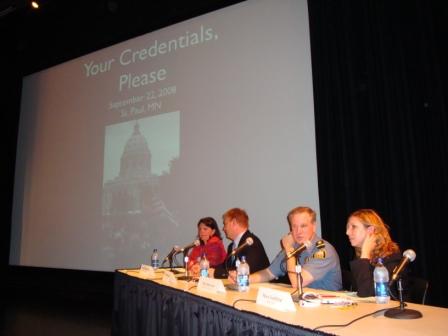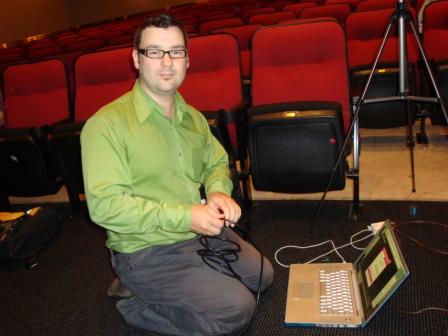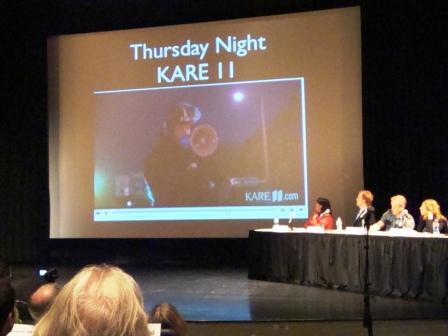
The good news is that the City of St. Paul, Minnesota, announced last week that it has dropped all charges against journalists who were caught up in the protests at the Republican National Convention. The bad news is that no one seems to know the definition of a journalist. Call me old fashioned, but I was taught the core principles of who, what, where, when and why. Answer those questions, stay out of the story, have a place to file it, and you were considered a journalist. It occurs to me that by presenting this definition, I am now part of this story for OffTheBus, and probably not a journalist -- citizen or otherwise. Why? I just gave you my opinion, and I used the "I" word -- several times.
About a hundred people gathered at the University of Minnesota in St. Paul to hear Al Tompkins of the Poynter Institute moderate a forum on what exactly happened to cause so many media arrests in St. Paul during the RNC. Among other things, the forum promo suggested that participants would learn what the police want media to understand about law enforcement's role, and whether reporters need to continue to follow the arcane credentialing process. Are credentials merely albatrosses hung around our necks in this new era of cellphone video and internet access for everyman and woman?
Sizing up the room, it looked like the forum could easily degenerate into finger-pointing between mainstream and non-traditional media. Early on, grumblings began that "mainstream" got preferential treatment by organizers of the RNC and the police. The forum looked a bit like a shot-gun wedding in a Catholic church, with mainstream media members huddled together on one side of the room and unhappy "citizen journalists" taking up the back rows. Those who were arrested had VIP seating. Two things were clear. The reporters in the audience were looking for some sort of definition and validation, and the ordinary citizens in attendance were looking for reliable sources of information.
Short conversations with those who were arrested, and those who escaped the police dragnets, brought home the fact that individual memories of crowd and police encounters during the RNC are seared into memory. Everyone had a story to tell, and recollections were encyclopedic as to streets, directions, cloud cover, locations, smells, sight and sounds. It was as if the story tellers had a GPS map of their encounters permanently imprinted upon their frontal lobes. The room reverberated with subtle sounds of post traumatic stress.
Chuck Olsen of theUpTake, looking a bit like a media geek version of Buddy Holly in a pea green shirt and glasses that put Sarah Palin's to shame, was sitting on the floor of the Coffman Memorial Union Theater. Olsen agreed to have an informal chat with OffThe Bus before things got going. He wasn't arrested, but had three camera angles of live streaming video during the stand-offs and arrests and a compelling story to tell. The details remain fresh and his story flowed in stream of consciousness. Faulkner would be proud. Olsen's live video feeds to the Internet documented the sound and fury of the police and protestors.
"After getting a taste of tear gas, I stayed behind," Olsen said while setting up his small video camera for the forum, which was organized by the Minnesota News Council, the Society of Professional Journalists, and the University's School of Mass Communication.
"Most of the crowd went ahead and I stayed behind in a car with some of my fellow citizen journalists in the Sears parking lot. It was a combination Fourth of July slash war zone. Police in full riot gear are yelling at us in the car, telling us to 'get the f@#$ out of the car.'"
Was he afraid?
"Yeah, I was terrified. On the brink of panicking, actually."
Why did the cops want you out of the car?
"I guess the car could be used as a weapon. We got out of the car and were kind of hiding under a nearby tree. The police knelt down and we thought for sure they were getting ready to fire tear gas, but it turned out they were just taking a break and removing their helmets to cool off. It was complete chaos for everyone. "
Aren't the St. Paul police well-regarded? OffTheBus had documented quite a few quotes that indicate they are generally loved by the people of the city.
"That's right. The St. Paul police are generally loved and well regarded. I think what happened is that there were so many police forces from around the country that it caused chaos in the police department."
Sarah Bauer (Executive Director of the Minnesota News Council) tells me you are a seasoned citizen journalist. How did you get into this situation?
"I was pretty scared, but it lasted maybe ten minutes. I'm a cautious guy. I use the cross-walks. I go with the lights. I was just following the crowd, following up on the interaction between the protesters and the police. It was my job. It was a story."
The bottom line is that the police reacted to the crowd. Was it too much? Olsen thinks so.
Art Hughes was arrested and saw clashes up close. He is now a freelancer, but just completed an eleven-year stint at Minnesota Public Radio. Another seasoned reporter with miles of recording under his belt, Hughes' report of the clashes sounded very much like Olsen's. Both guys were frightened by what came down. Hughes recounted his experience near the Marion Street bridge.
"We came around the building and the police had put down a line and started firing ordinance into the crowd...."
Ordinance?
"Yeah, concussion grenades, pepper spray, maybe tear gas, I'm not sure, but they were firing directly into the crowd."
Was he frightened?
"Yes, and uncertain as to where to go."
Did he get caught on the bridge in the mass arrest?
"I left, thinking it was over after the grenades were fired. I peeled off from the main group and encountered a riot cop pointing something at me." Hughes was eventually cuffed, arrested, and taken to the Ramsey County Detention center, RNC credentials dangling from his neck.
Coleen Rowley bounced into the auditorium with typical enthusiasm and clipboard in hand. We are friends and fellow Huff Post columnists. I was relying on her always ethical point of view, since I was in Africa and did not follow any realtime press on the RNC conflicts at all.
Rowley had two documents she wanted to share. The first was a news clipping of her "Spotlight" letter to the St. Paul Pioneer Press, "Patriots Can't Stay Home." It was published weeks before the RNC convened.
"This made me out to be a liar," she said.
A liar?
Rowley pointed to the line in the tattered clipping that says right wing news has frightened people into thinking prudence is the better part of valor, rather than risking arrest and more.
"What kind of a democracy is this if we let citizens become unnecessarily intimidated about being tasered, pepper-sprayed, infiltrated, spied on or photographed by cameras installed on public streets?" the letter read.
Rowley was taking responsibility for urging people to come out to peacefully protest and then getting caught up in the violent protests and police reactions.
"I basically told people that they would not be pepper-sprayed and arrested and tear-gassed, and they were." She shook her head and flipped the pages on the clipboard to a letter she received from a bail bond company on August 18. At the time, Rowley was in the throes of organizing A Peace Island Family Picnic on Harriet Island as a form of peaceful protest. From the tone of the letter, the bail bond company figured arrest was a good possibility for the former FBI agent and 9/11 whistleblower.
"...if any of your members find themselves in a situation of being arrested and jailed, please find comfort within this company," read part of the August 18 letter.
"There are so many things that went wrong at the RNC. Mistakes were made and it would take a huge investigation to sort it all out," Rowley said. She emphasized that expectations were raised that there would be trouble. Having the Republican Party put $50 million dollars into the security forces did not help. She recounted her shock at sitting in the iconic landmark, Mickey's Diner, and seeing what looked like storm troopers marching down the street on convention Tuesday.
The Poynter guy, Tompkins, finally took the stage and introduced the panel, which included St. Paul Deputy Mayor Anne Mulholland, St. Paul Assistant Police Chief Matt Bostrum, KARE-11 videographer Jonathan Malat, and Mara Gottfried of the Pioneer Press.
Tompkins immediately set ground rules about civility, and people in nearby seats started grumbling. Tompkins was commanding the stage like he was orating a scene from Macbeth, and the audience wasn't happy from the get-go. "Pompous" was the word being exchanged in whispers.
The panel was thrown off guard and onto immediate defense by his grilling. My notebook reads: "He is treating them like they are freshman in journalism 101 instead of experts with their own POV. This is not good."
Tompkins cautioned that "we are not here for a witch hunt," and then turned to Mulholland and the hapless Bostrom and said, "It took a lot of guts for you to come here."
After playing some video of the protests and police response, Tompkins challenged Bostrom to tell the audience "what we did not see" in the video. Huh?
Deputy Bostrom gamely took the bait, tried to explain march routes and permitting, and finally shrugged a "They wanted to turn us against each other," when explaining how marchers refused to ask for permit extensions, which he says his forces were prepared to issue "on the fly." This seemed to be a reference to the clash after the plug was pulled on the Rage Against the Machine Concert.
Deputy Mayor Mulholland was asked repeatedly to provide her own definition of a journalist. She said over and over again that she did not know. Tompkins crossed the line and demanded to know whether Mulholland knows how her boss Mayor Chris Coleman felt, and what he "believes" regarding legitimate reasons for journalists to be in certain areas when covering a news story.
Mulholland hung on throughout the grilling and emphatically stated she "believes it is important for journalists to be wherever people are gathered lawfully." She never professed to read the Mayor's mind. She does care about her city and said so.
Mara Gottfried of the Pioneer Press was looking down at the table top, making circles with her pen, and it was hard to tell if she was taking notes or just wishing she were somewhere else. All too soon, it was her turn.
"Why weren't you arrested?" Tompkins asked, padding like a panther toward the panelist's table on stage left. "Show us what your credentials look like."
Gottfried, looking very wary, held up a press badge from the Pioneer Press and an RNC credential for one day. She told her story from her credentialed Point of view after much prompting and veiled suggestions from Tompkins that she received preferential treatment because she was "embedded." Seeming nervous, Gottfried said that she was scheduled for a "ride-along" with police for one day, watched the protests at which Amy Goodman was arrested with no problem, and was present and not arrested at the infamous Rage Against the Machine concert, which started a world of trouble for peaceful protesters.
Gottfried held up.
Coleen Rowley finally could not take it anymore, went to the microphone and asked the question that is asked in every journalism ethics class. Does the credentialing process, by its very nature, compromise the required neutral point of view of the journalist?
She got some light applause, but no one answered the question.
Jonathan Malat, the KARE-11 videographer on the panel, had no complaints that he was briefly arrested. This was unexpected news. A credentialed guy gets arrested--overturning alternative media's contention that the mainstream gets preferential treatment. It was his "duty as a journalist" to be where the story was and take his lumps. There are no guarantees of safety in life and in journalism he said. The guy even bought up the Constitution and the "fourth estate." For a moment it seemed as if the forum might be getting somewhere.
Tompkins obfuscated and put up a slide of a guy in a very weird looking gas mask and another of an Abbie Hoffman look-alike with a bullhorn. "Are these journalists?" he demanded.
And so it went, back and forth for 90 minutes with audience input that derailed the whole process into a tangential discussion of whether independent media got the shaft with a metaphorical nightstick and the mainstream got off scott free
Against each and every alarm bell going off about not getting involved in the discussion, I approached the microphone in the last nine minutes. Anchor Rick Kupchella of KARE-11 was ahead of us and there was no chance to get in a question if he did not step aside. Nice guy that he seems to be, Kupchella yielded.
"Mr. Tompkins. Do you teach the basics of who, what, where, when, and why in your journalism classes?
He glared down at like I was a bug to be squished.
"Why do you ask that?" the panther purred.
"Well it seems it would help answer the question as to what a journalist is."
"That is only part of what a journalist does." Tompkins said. No follow-up allowed.
It was over. No clear definition of a journalist was reached. The deputy had no solid suggestions to take back to the city of St. Paul to help prevent a repeat of the RNC protests and the aftermath, and members of the general public had no idea whom they could count on for solid information in this critical election year. No one, journalists included, knew if they were "officially" journalists.
Minnesota is a swing state, with McCain and Obama in a virtual dead heat. 10,000 people came out to an airplane hangar in Anoka last week to hear McCain, while Obama supporters staged a counter rally in downtown Minneapolis. Voters are pleading for guidance from the media on important issues. The economy is in shambles, the war is ongoing, Africa is totally exploited, and our energy policy is a mess. The politicians are beating each other up and the American public requires a steady, stable, neutral point of view from the fourth estate. You know, that checks and balance thing Thomas Jefferson mentioned in the Bill of Rights.





